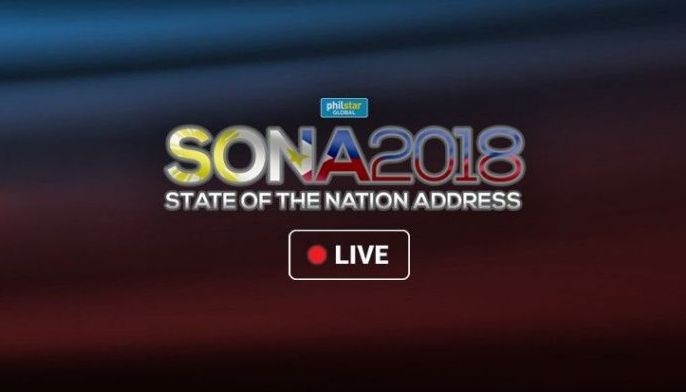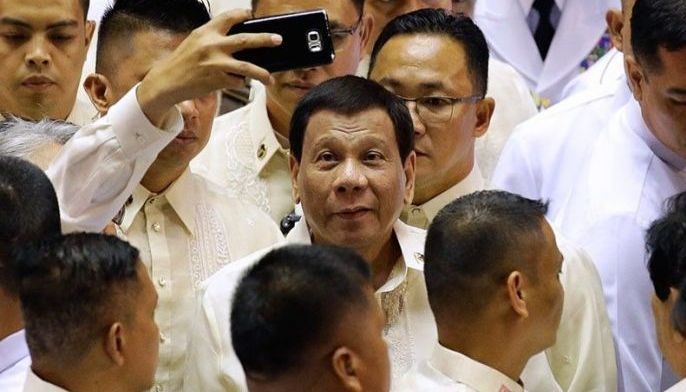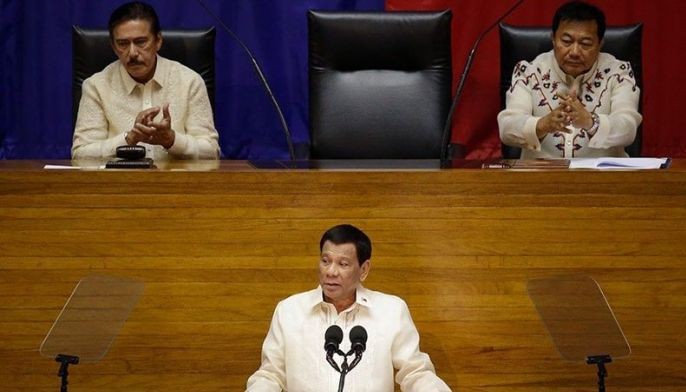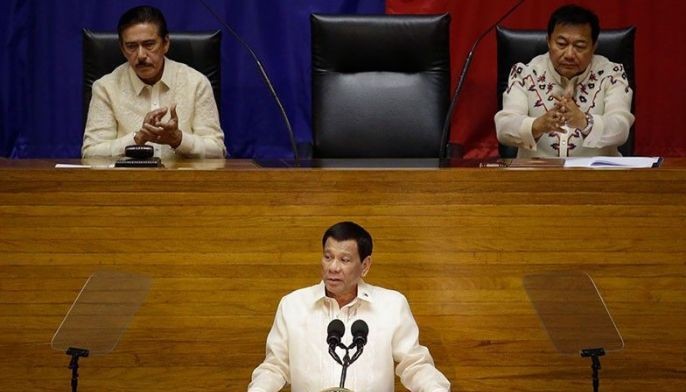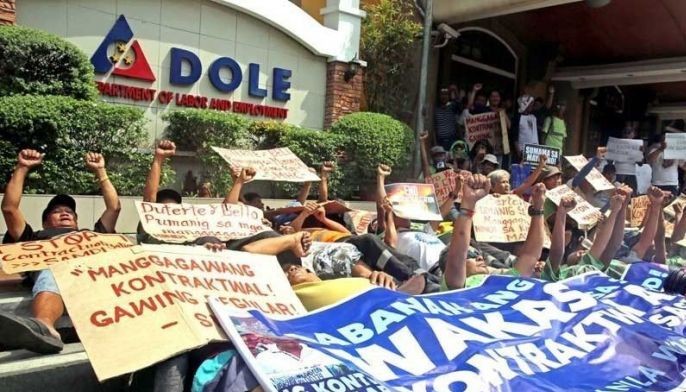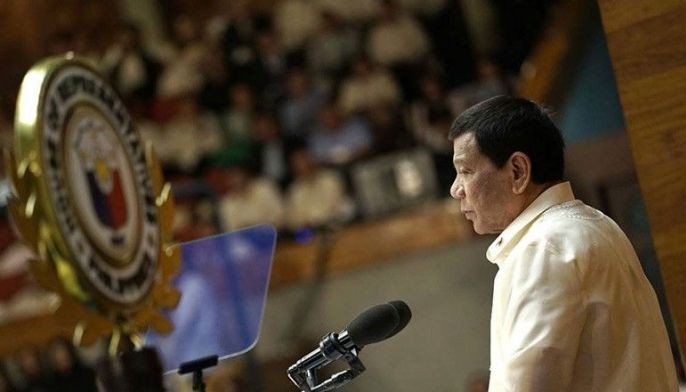Commentary: A sober 3rd SONA
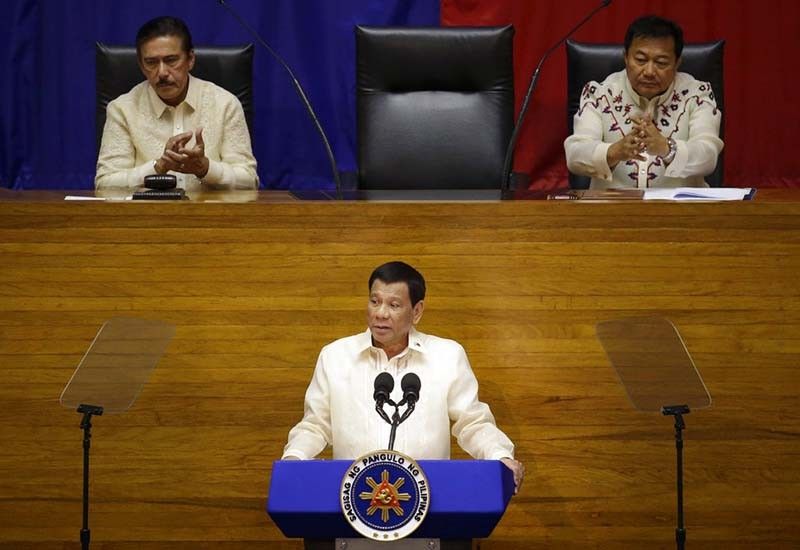
Contrary to public expectations, the third State of the Nation Address was not ridden with tirade, outrageous ad-libs and cursing. Instead, it was the shortest in comparison with the previous two addresses. As it was delivered in a more presidential-like fashion and focused on perceived pressing issues, its brevity also speaks of the contents where critics were either left with almost nothing to talk about or with all the missing things to talk about.
On one hand, the SONA was right about many things or issues; on the other hand, the scant attention given to them makes it more like a warning than an elaboration of the real state of political affairs.
While the continuous drive versus illegal drugs must be pursued, nothing was mentioned about the proper procedures in undertaking what the president calls “relentless and chilling” persistence of the “war on drugs.” He stressed the exigency of the drug war to curbing crime and wasting of the youth of the country. The issues of accountability and impunity of this “operation” that has counted thousands of victims of violence were not tackled.
He expressed his disgust for corruption, likening it to a leech that bleeds the government of funds meant for infrastructure and social development projects. This was followed by a forewarning on the agencies and officials allegedly engaged in corruption. There was no mention, however, of the appointees who from resignation or dismissal have been reassigned or re-appointed to government positions.
One of the twists of the day, expectations on the signing of Bangsamoro Basic Law, was put on hold but with a promise that it would be signed into law within 48 hours after review. He even uttered in jest, “Baka may isiningit kayo diyan na ‘di ko alam?” to express his concern about the intent of the bill and its impact to the Muslim population. In addition, he again offered reintegration for the radical elements and assistance in their transition to embrace peace.
The president applauded Congress for the timely passage of the Tax Reform for Acceleration and Inclusion law. Amidst concerns on the inflationary pressures, he highlighted social mitigating measures already underway such as the unconditional cash transfer, fuel vouchers for public utility vehicle operators and the distribution of the National Food Authority rice.
Duterte then urged lawmakers to pass Package 2 which lowers corporate income taxes for the benefit of small businesses. On the other hand, he committed that by the end of the month, all five tax packages—covering increased taxes on mining, alcohol and tobacco; reform in property valuation, capital income and financial taxes; and an amnesty program—will be submitted to Congress by the end of the month.
Echoing long-standing calls from his economic managers, Duterte expressed his support for amending the Agriculture Tariffication Act switching from the current quota system to a tariff system where rice can be imported more freely and significantly reduce prices by seven pesos. He then warned rice hoarders, cartels and protectors that they will be brought to justice if they continue taking advantage of consumers.
On his government’s commitment to enhance the delivery of its frontline services, he noted the passage of the Ease of Doing Business Law and ordered government agencies to simplify their processes and make transactions fast and convenient for citizens.
Duterte reiterated the need to end contractualization. To further this policy, he referred to Executive Order No. 51, which seeks to protect the workers’ rights to security of tenure. However, he elucidated that to totally put an end to contractualization, there has to be a law enacted by Congress, which is already beyond his powers.
To benefit the coconut farmers, a significant part of the agriculture sector, the president urged lawmakers to pass the bill establishing the Coconut Farmers’ Trust Fund.
Duterte encouraged the entry of a third telco player to create healthy competition that would benefit consumers. He supported DICT’s policy of choosing the offer with the Highest Committed Level of Service and reasonably accessible prices. He also supported NTC’s policy to impose lower interconnection rates.
In passing, the president commended the members of the Consultative Committee that was created to draft the federal constitution and the ongoing efforts for charter change. He envisions to “strengthen the democratic institutions” and “create an environment for Filipinos to grow regardless of status, religion and ideology”. However, recent national surveys show that majority of Filipinos do not agree to a federal set-up and constitutional change.
Duterte underscored his promise to provide affordable health care to every Filipino. While a lot still needs to be done to improve the health system in the country, the president acknowledged some progress and cited the current institutionalization of the unified implementation of the No Balance Billing Policy through which the government and the private health care providers will establish an order of charging medical expenses. He directed agencies to streamline various sources of financial assistance for those with health-related needs.
He also urged for the speedy passage of the Universal Health Care Bill and blamed several policies and operational bottlenecks that have constrained such from taking effect. He intends to pool resources for health services under the Philippines’ institutionalized primary care as a pre-requisite to access a higher level of health care and supplement resource gaps in local government units.
The focus on healthcare is indeed laudable but the president’s SONA advisers may have missed a big opportunity to harvest a low hanging fruit in the pending National Integrated Cancer Control Bill now pending and gaining strong support from both Houses of Congress. Cancer has been ignored by policy leaders not knowing that recent health statistics reveal it to be the country’s third highest cause of death that directly and indirectly affects millions of Filipinos because of the resulting financial catastrophe.
After decades of advocacy, a formidable coalition of cancer stakeholders are now on the verge of passing what may be landmark legislation now supported by more than 200 congressmen and the majority of the Senate. Certifying the Cancer Control bill as priority will resonate across all classes, rich and poor. If the president signs this into law this year, he will gain millions of grateful supporters who are personally attached to this cause.
In terms of international relations, Duterte projected once again the promotion of an “independent foreign policy” where the national security goals of the country should come first. In this aspect, he mentioned that having an “energized and improved” relations with China “does not mean that we will waiver in our interest in the West Philippine Sea.” More so, through a bilateral and multilateral platform, the Code of Conduct and consultative mechanism would be upheld within the ASEAN, China and Philippine relations.
In general, the delivery of the third SONA is commendable, and an improvement compared with the past addresses. However, the negligible explanation provided still proves the incomprehensive attention to all these pressing issues.
To re-establish the rule of law does not solely mean the imposition of self-determined and independent policies. All the efforts toward radical change should not be anchored solely on “strong” or “politically willing” individuals and dauntless pronouncements but on reformed institutions as well. The scant attention being given to institutional reforms would simply undermine all the efforts toward meaningful radical change.
Dindo Manhit is the founder and managing director of the Stratbase Group, a partner of Philstar.com.
- Latest
- Trending






